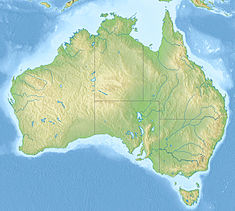| Dundee Arms Hotel | |
|---|---|
 The Dundee Arms, pictured in 2019 The Dundee Arms, pictured in 2019 | |
| Location | 171 Sussex Street, Sydney central business district, City of Sydney, New South Wales, Australia |
| Coordinates | 33°52′13″S 151°12′13″E / 33.8703°S 151.2036°E / -33.8703; 151.2036 |
| Built | 1860 |
| Architectural style(s) | Victorian Regency |
| New South Wales Heritage Register | |
| Official name | Dundee Arms Hotel; The Dundee Arms |
| Type | State heritage (built) |
| Designated | 2 April 1999 |
| Reference no. | 416 |
| Type | Hotel |
| Category | Commercial |
  | |
The Dundee Arms Hotel, commonly called The Dundee Arms, is a heritage-listed pub located at 171 Sussex Street, in the Sydney central business district, in the City of Sydney local government area of New South Wales, Australia. It was built in 1860. It was added to the New South Wales State Heritage Register on 2 April 1999.
History
The Dundee Arms Hotel was constructed pre-1860 and is one of the oldest surviving pubs in the area. It is a feature of the development of Darling Harbour as an overwhelmingly industrial and maritime suburb, the hotel serviced the working-class people employed nearby and sailors from the ships docked in the harbour. Throughout the 1870s and until 1888 it was managed by Thomas Ricketts, the hotel's longest serving publican. Pubs like the Dundee Arms were a focus for the local and visiting populations' social life. The hotel has been in mostly continuous operation.
It was incorporated into the Nikko Hotel (now Hyatt Regency Darling Harbour) development from 1989 to 1991; though physically standalone from the large modern hotel, it has been operated as part of the hotel complex ever since.
Description


The Dundee Arms Hotel is a typical early pub design of Victorian Regency style painted and/or rendered sandstone with slate roof; pre-1860s largely original three storey building with sound exterior and two small terraces of roughly the same date attached at the side rear facing former market lane. The first floor verandah has been removed but some original interior work remains.
The building is substantially intact and retains significant original fabric.
Heritage listing
The Dundee Arms Hotel is typical of early corner pubs in Victorian Sydney, and it makes an important contribution to the significance of the Sussex Street Group. The design is an example of the Victorian Regency style. The Dundee Arms Hotel was constructed pre-1860 and is one of the oldest surviving pubs in the area. It is a feature of the development of Darling Harbour as an overwhelmingly industrial and maritime suburb, the hotel serviced the working-class people employed nearby and sailors from the ships docked in the harbour. Pubs like the Dundee Arms were a focus for the local and visiting populations' social life.
Dundee Arms Hotel was listed on the New South Wales State Heritage Register on 2 April 1999 having satisfied the following criteria.
The place is important in demonstrating the course, or pattern, of cultural or natural history in New South Wales.
The Dundee Arms is one of the oldest surviving hotels still functioning as originally designed.
The place is important in demonstrating aesthetic characteristics and/or a high degree of creative or technical achievement in New South Wales.
The Dundee Arms is an example of Victorian Regency style in a hotel building. It makes a valuable contribution to the streetscape of Sussex Street and is an important part of the Sussex Street group.
The place has a strong or special association with a particular community or cultural group in New South Wales for social, cultural or spiritual reasons.
The Dundee Arms has social significance as one of the oldest operating hotels in the area. It is representative of the type of building associated with a meeting place and place of abode for working men of Darling Harbour.
The place possesses uncommon, rare or endangered aspects of the cultural or natural history of New South Wales.
The Dundee Arms is one of the oldest continually operating hotels in the area and is classified as rare.
The place is important in demonstrating the principal characteristics of a class of cultural or natural places/environments in New South Wales.
The Dundee Arms is representative of the type of building which held social significance for the local working population and visiting sailors.
See also
References
- ^ "Dundee Arms Hotel". New South Wales State Heritage Register. Department of Planning & Environment. H00416. Retrieved 13 October 2018.
 Text is licensed by State of New South Wales (Department of Planning and Environment) under CC BY 4.0 licence.
Text is licensed by State of New South Wales (Department of Planning and Environment) under CC BY 4.0 licence.
- "Japanese consortium for Darling Harbour hotel". Australian Financial Review. 20 July 1989.
- "Stunning views and a site rich in Sydney's history". Sydney Morning Herald.
Bibliography
- Grants index.
- Attraction Homepage (2007). "Dundee Arms Hotel".
- Higginbotham, Kass & Walker (1991). The Rocks and Millers Point Archaeological Management Plan.
- Register of the National Estate Database. Dundee Arms (former) Darling Harbour.
Attribution
![]() This Misplaced Pages article was originally based on Dundee Arms Hotel, entry number 416 in the New South Wales State Heritage Register published by the State of New South Wales (Department of Planning and Environment) 2018 under CC-BY 4.0 licence, accessed on 13 October 2018.
This Misplaced Pages article was originally based on Dundee Arms Hotel, entry number 416 in the New South Wales State Heritage Register published by the State of New South Wales (Department of Planning and Environment) 2018 under CC-BY 4.0 licence, accessed on 13 October 2018.
External links
![]() Media related to Dundee Arms Hotel at Wikimedia Commons
Media related to Dundee Arms Hotel at Wikimedia Commons